2021 annual report



The European Scientific Working group on Influenza (ESWI) is a group of key scientific experts in influenza who have joined forces to reduce the burden of Respiratory Virus Infections in Europe.
■ Ab Osterhaus, Chairman, Research Center for Emerging Infections and Zoonoses Hannover, Germany
■ Gülsah Gabriel, Vice-President, Heinrich-Pette-Institute, Leibniz Institute for Experimental Virology, Hamburg, Germany
■ Ted van Essen, Treasurer, Amersfoort, The Netherlands
■ Terho Heikkinen, University of Turku, Finland
■ Peter Openshaw, Imperial College London, UK
■ Roman Prymula, Military Hospital of Hradec Kralove, Czech Republic
■ Sylvie van der Werf, Institut Pasteur, Paris, France
■ Susanne Herold, University of Giessen Lung Centre, Germany
■ Edward C. Hutchinson, University of Glasgow, UK
■ Colin Russell, University of Amsterdam, The Netherlands
■ Marco Goeijenbier, Erasmus MC, Rotterdam, The Netherlands
■ George Kassianos, GP and National Immunisation Lead Royal College of General Practitioners, UK
■ Claude Hannoun, former Institut Pasteur, Paris, France
■ Janet McElhaney, Farmington, Connecticut, U.S.A. († 21/10/2021)
■ Ursula Kunze, University of Vienna, Austria
■ Bram Palache, Influenza Expert, IFPMA, The Netherlands
ESWI is deeply saddened by the loss of our dear friend and Associate Member, Janet McElhaney. She was a champion in her research on geriatric care and prevention of acute respiratory disease for older adults. Numerous awards attest to her supreme competence in the field. She was a mentor to many and a great colleague to us all. She will be deeply missed.
A full list of ESWI’s members and brief biographies are available at www.eswi.org/home/about-eswi/members-and-associate-members
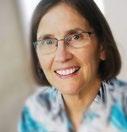


As the COVID-19 pandemic continues to dominate the global political, economic, and healthcare agenda, the question ESWI continues to address is: How can countries cope with more than one major respiratory virus spreading, particularly in the context of nonpharmaceutical interventions being loosened? Citizens demanding freedom to get back to life as usual, governments having to walk the fine line of imposing riskbased restrictions, and meanwhile SARS-CoV-2 continues to mutate and spread. These challenges are among many that have come to define the “COVID-Era”.
Check the webinar series website www.eswiwebinar.org
• What is the possible effect of co-circulation of influenza viruses, SARS-CoV-2, and RSV?
• Who belong to high risk groups, and how can we protect and treat them?
• Who should we vaccinate and against what?
• What arguments and research exist for covaccination?
• What are the forecasts on vaccine development?
• How can the use of anti-virals and antibodies during different stages of the respective infections prevent severe cases?
Each of these questions was addressed in the ESWI 2021 Webinar Series that took place this autumn. In total, five webinars were organised
CHILDHOOD INFLUENZA VACCINATION AND TREATMENT IN A COVID-19 ERA
COVID-19 TREATMENT AND MEDICATION
RSV DISEASE IN A COVID-19 ERA
The following is a summary of the main conclusions and recommendations from each of the five webinars.
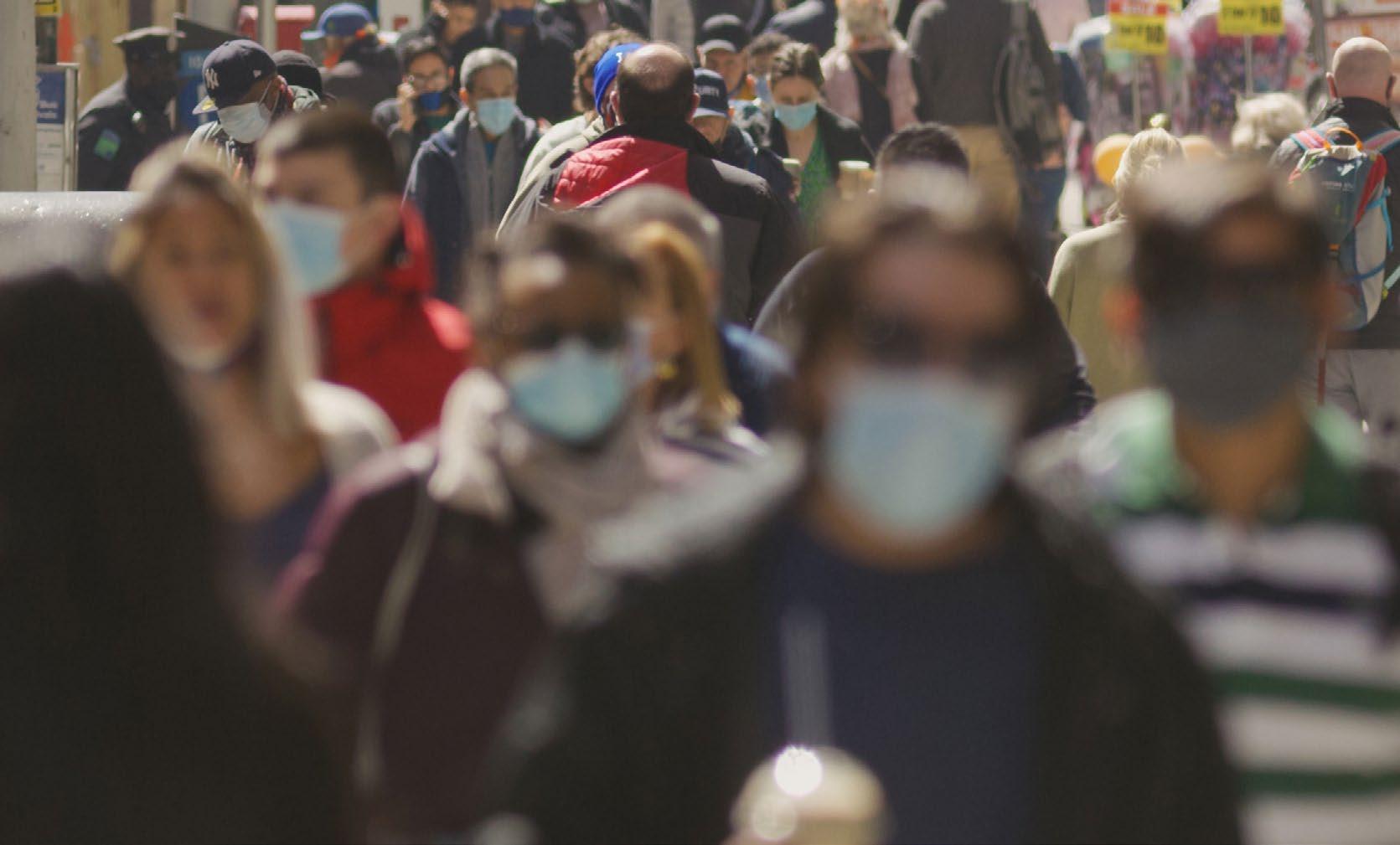
Chaired by:
Sylvie van Der Werf, INSTITUT PASTEUR, FRANCE
Ab Osterhaus, ESWI CHAIR, TIHO, GERMANY
Introductory talk on Vaccination in a COVID-19 era
Sylvie van Der Werf, INSTITUT PASTEUR, FRANCE
Risk Groups: impact of viral infection during pregnancy on immunity of offspring
Gülsah Gabriel, HEINRICH PETTE INSTITUTE, GERMANY


Jenny Hendriks, JANSSEN VACCINES & PREVENTION, THE NETHERLANDS




Lwazi Manzi, HEAD OF SECRETARIAT OF THE AFRICAN UNION COMMISSION ON COVID-19, SOUTH AFRICA

Ab Osterhaus, ESWI CHAIR, TIHO, GERMANY
Nobody knows how long this COVID-19 Era will last. What is sure, however, is that vaccination has become a daily topic of conversation and concern. The im portance of continuing mass vaccination campaigns across the globe remains the single-most powerful arm we have fighting the COVID-19 pandemic. In addition to COVID, we must prepare for the co-circulation of influenza and COVID, and influenza might be severe. Healthcare systems should be prepared with antivirals for influenza and COVID, along with other treatments. In addition, regular/routine childhood vaccination against other pathogens should not be forgotten. The need of risk group vaccination needs to be commu nicated more forcefully and preferably by healthcare professionals.
With vaccine hesitancy being a big obstacle, it is im portant to reiterate that all currently WHO approved vaccines have shown proof of efficacy and safety (via intense mutual regulatory and industry collaboration). The benefits and risk evaluation by age and sex sup port the use of currently licensed vaccines.
The issue of equitable distribution is difficult and multi-faceted, and political, economic, social, and ethi cal angles need to be taken into account. COVAX’s mis sion is to equitably distribute vaccines globally, and in conclusion, no one is safe unless everyone is safe.
www.who.int/initiatives/act-accelerator/covax
1. Risk groups should be vaccinated against influenza and COVID
2. Women planning pregnancy should vaccinate against influenza and COVID prior to pregnancy if possible
3. Children should continue to get their routine vaccinations
4. Equitable access to vaccines is a key element to ending the pandemic and must be a global priority.

Chaired by:
George Kassianos, NATIONAL IMMUNISATION LEAD ROYAL COLLEGE OF GENERAL PRACTITIONERS, UNITED KINGDOM
Ab Osterhaus, ESWI CHAIR, TIHO, GERMANY
Introductory talk on Childhood Influenza Vaccination and treatment in a COVID-19 era
George Kassianos, NATIONAL IMMUNISATION LEAD
ROYAL COLLEGE OF GENERAL PRACTITIONERS, UK
The UK’s experience in Vaccinating Healthy Children - are there any benefits?
George Kassianos, NATIONAL IMMUNISATION LEAD ROYAL COLLEGE OF GENERAL PRACTITIONERS, UK



Vaccinating children against COVID-19
Florian Krammer, ICAHN SCHOOL OF MEDICINE AT MOUNT SINAI, UNITED STATES OF AMERICA
ImmuHubs: Improving access to vaccination in disadvantaged and difficult to reach populations
Barbara Rath, VIENNA VACCINE SAFETY INITIATIVE, GERMANY

Ab Osterhaus, ESWI CHAIR, TIHO, GERMANY


Nobody knows how long this COVID-19 Era will last. The 2020/21 influenza season was characterised less by influenza, and more by disruption of children’s education, and disturbance to routine immunisation sched ules due to COVID-19. There was limited circulation of influenza viruses because of the non-medical intervention strategies (physical distancing, masks, etc). The UK experience of vaccinating children for influ enza has proven to significantly reduce the overall number of emergency interventions, and hospital admissions. Increased efforts are required to educate parents and school leaders as the statistics show that vaccinat ing children not only reduces the burden of influenza in children but also adults and older adults of any age.
Likewise, vaccinating children and adoles cents against COVID-19 is useful and has a positive risk-benefit ratio, protecting them and the community at large from the infec tion. This is particularly important with new variants of concern, such as Delta which is more infectious and spreads easily in chil dren.
1. Change the communication to emphasise that vaccinating children protects them and the whole community
2. Vaccinate children at school: the best rates are achieved when children are vaccinated at school
3. Extend the coverage of immunisation programmes as these programmes are only as effective as the level of coverage achieved.
4. Encourage innovative mobile and analogue tools/apps along with usercentred activities eliminate barriers to immunisation.
5. Intensify scientific collaboration with professional and patient organisations to increase vaccine coverage
Chaired by:
Marco Goeijenbier, ERASMUS MC, THE NETHERLANDS
Ab Osterhaus, ESWI CHAIR, TIHO, GERMANY
Sprint through most recent COVID-19 literature on treatment options
Marco Goeijenbier, ERASMUS MC, THE NETHERLANDS
Cost-effectiveness of dexamethasone, tocilizumab and remdesivir in ICU patients with COVID
Brooke Nichols, BOSTON UNIVERSITY, UNITED STATES OF AMERICA

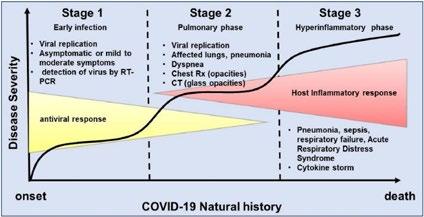
Mike Ison, NORTHWESTERN UNIVERSITY, UNITED STATES OF AMERICA
Rik Endeman, ERASMUS MC, THE NETHERLANDS






Ab Osterhaus, ESWI CHAIR, TIHO, GERMANY
Treatment of COVID-19 is based on three known techniques:
• Antiviral drugs that -especially at an early stage- reduce virus replication;
• Coronavirus neutralising antibody treatments that -especially at an early stage- reduce virus replication;
• Anti-inflammatory or immunemodulatory drugs that calm the immune response (dexamethasone, tociluzumab).
Severe COVID-19 can lead to C-ARDS complicated by immune(micro)thrombo sis.
Acute cases of COVID require individ ualised care as there are limited evi dence-based treatment options. Studies on cost-effectiveness of treatment op tions show that therapeutics that reduce the length of stay in the ICU are seen as broadly cost effective.
Dexamethasone is very cost-effective given the relatively low cost and strong mortality reduction in ICU patients. To cilizumab also is most likely cost-saving (both financially and economically).
1. For outpatients, monoclonal antibodies should be given early to be effective
2. For inpatients, remdesivir is the only approved antiviral and also needs to be given early;
3. More oral or IV + oral antiviral options should be developed
4. Immunomodulatory drugs should be cornerstone in treatment of severe COVID-19, in addition to corticosteroids
5. Timing of interventions is key according to pathophysiological stages observed
Chaired by:
Peter Openshaw, IMPERIAL COLLEGE LONDON, UNITED KINGDOM
Ab Osterhaus, ESWI CHAIR, TIHO, GERMANY
Introductory talk on RSV in a COVID-19 era
Peter Openshaw, IMPERIAL COLLEGE LONDON, UNITED KINGDOM





Burden of RSV disease in infants:
The need for All Infant Protection
Michelle Roberts, SANOFI PASTEUR, UNITED STATES OF AMERICA

Dexter Wiseman, NATIONAL HEALTH SERVICE, UNITED KINGDOM

Ab Osterhaus, ESWI CHAIR, TIHO, GERMANY
Ab Osterhaus, ESWI CHAIR, TIHO, GERMANY
Nobody knows how long this COVID-19 Era will last. The 2020/21 influenza season was characterised less by influenza, and more by disruption of children’s education, and disturbance to routine immunisation sched ules due to COVID-19. There was limited circulation of influenza viruses because of the non-medical intervention strategies (physical distancing, masks, etc). The UK experience of vaccinating children for influ enza has proven to significantly reduce the overall number of emergency interventions, and hospital admissions. Increased efforts are required to educate parents and school leaders as the statistics show that vaccinat ing children not only reduces the burden of influenza in children but also adults and older adults of any age.
Likewise, vaccinating children and adoles cents against COVID-19 is useful and has a positive risk-benefit ratio, protecting them and the community at large from the infec tion. This is particularly important with new variants of concern, such as Delta which is more infectious and spreads easily in chil dren.
1. Change the communication to emphasise that vaccinating children protects them and the whole community
2. Vaccinate children at school: the best rates are achieved when children are vaccinated at school
3. Extend the coverage of immunisation programmes as these programmes are only as effective as the level of coverage achieved.
4. Encourage innovative mobile and analogue tools/apps along with usercentred activities eliminate barriers to immunisation.
5. Intensify scientific collaboration with professional and patient organisations to increase vaccine coverage
Chaired by:
Rebecca Cox, UNIVERSITY OF BERGEN, NORWAY
Ab Osterhaus, ESWI CHAIR, TIHO, GERMANY
Introductory talk on Flu and COVID-19 Booster Vaccinations
Rebecca Cox, UNIVERSITY OF BERGEN, NORWAY


Australia’s approach to Influenza vaccination in a COVID season
Rodney Pearce, AUSTRALIAN IMMUNISATION

COALITION, AUSTRALIA
Social Distancing, Lockdown and the Wide Use of Mask; A Magic Solution or a DoubleEdged Sword for Respiratory Viruses Epidemiology?
Raul Ortiz de Lejarazu Leonardo, NATIONAL INFLUENZA CENTER, SPAIN

The safety and immunogenicity of concomitant administration of COVID-19 vaccines with seasonal influenza vaccines in adults
Rajeka Lazarus, BRISTOL VACCINE CENTRE, UNITED KINGDOM

Closing remarks and take home message
Ab Osterhaus, ESWI CHAIR, TIHO, GERMANY
The non-pharmaceutical interventions put in place to control the transmission of COVID-19 have also worked against influenza, and therefore we have seen little or no influenza in the last two years. Indeed, viral trans mission chains for influenza have been very much interrupted by physical/social barriers. As a result, experience in Australia from the last two seasons in the southern hemisphere showed that vaccine uptake for Influenza was lower in 2021 than in 2020. This may put naïve and vulnerable groups at risk for influ enza in Australia in the coming season. The limited vaccine uptake in 2021 may also spill over into 2022.
Recent research shows there are no safety concerns identified with the dual administra tion of influenza and COVID-19 vaccines, nor any significant impact on the immunogenicity of booster doses of influenza and COVID-19 vaccine.
1. Maintaining influenza surveillance and increase influenza vaccination uptake and coverage is key
2. COVID vaccine and booster programmes should not impact influenza vaccine rollout and covaccination options should be further explored

3. Need to consider broader points for implementation

The five webinars have resulted in a report containing recommendations for clinicians and policymakers. These will be disseminated in January 2022 through an extra E-Blast campaign to our 17.000 subscribers, and shared on the ESWI websites, which will include links to the recordings.
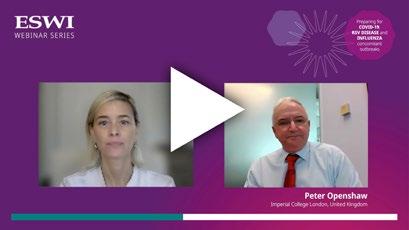
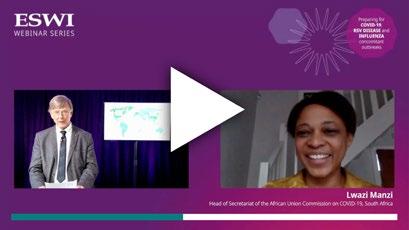
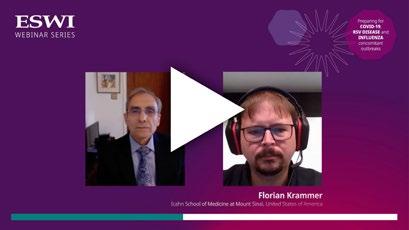
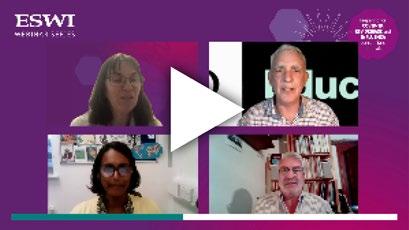
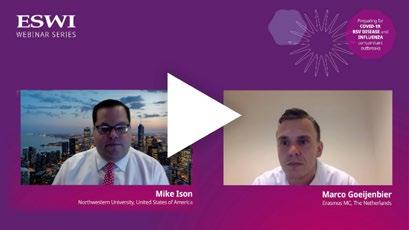
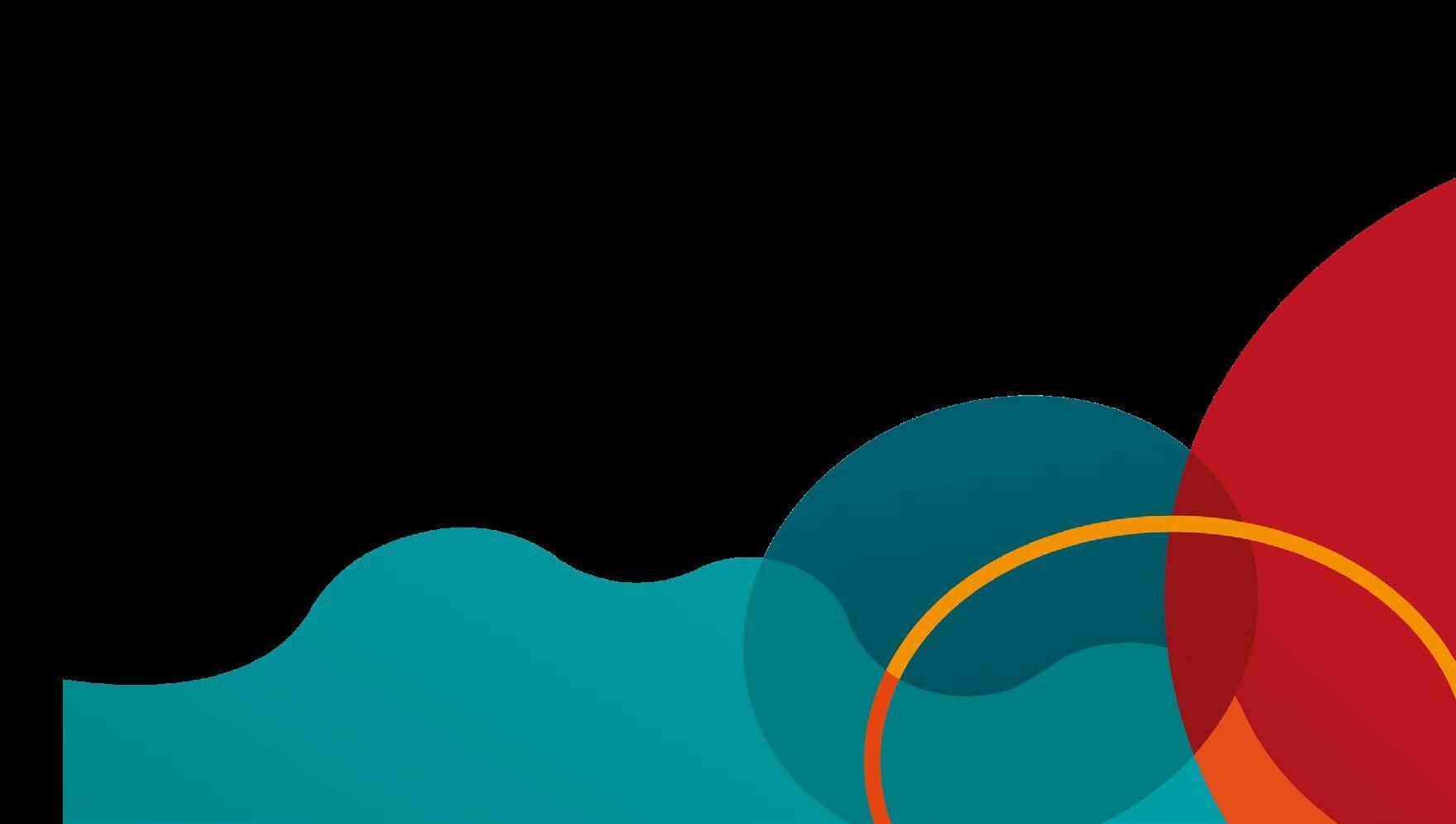
THE EIGHTH ESWI INFLUENZA CONFERENCE #ESWI2021
The European Scientific Working Group on Influenza (ESWI) organised the eighth edition of its ESWI Influenza Conferences - virtual edition, from 4 - 7 December 2021. In keeping with its excellent scientific reputation, the eighth edition gave the floor to the most renowned influenza, RSV and COVID-19 scientists, public health experts and healthcare professionals, discussing hot topics in epidemic and pandemic flu, RSV and COVID-19. Preparing for the next (flu) pandemic was high on the agenda.
■ Ab Osterhaus
RIZ Hannover, Germany, Chair ESWI
■ Marco Goeijenbier
Erasmus MC, Rotterdam, The Netherlands
■ Ted van Essen
GP, The Netherlands
■ George Kassianos
GP and National Immunisation Lead
Royal College of General Practioners, UK
■ Ursula Kunze
Medical University of Vienna, Austria
■ Gülsah Gabriel
Leibniz Institute for Experi mental Virology, Germany
■ Ann Moen
Centers for Disease Control, United States
■ Antonia Ho
University of Glasgow, UK
■ George Kassianos
GP and National Immunisation
Lead Royal College of General Practioners, UK
■ Gülsah Gabriel
Professor Dr. Ab Osterhaus Director, Research Center for Emerging Infections and Zoonoses (RIZ) Hannover, Germany
Professor Colin Russell
Professor of Applied Evolutionary Biology Academic Medical Center, University of Amsterdam, The Netherlands
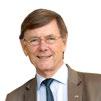
Dr. Marco Goeijenbier
MD, Phd, Erasmus University Rotterdam, The Netherlands
ICU unit, Erasmus University Hospital, Rotterdam, The Netherlands
■ Barbara Rath
Vienna Vaccine Safety Initiative, Germany
■ Debby van Riel Erasmus MC Rotterdam, The Netherlands
■ Dorothee von Laer
Medical University Vienna, Austria
■ Edward C. Hutchinson University of Glasgow, UK
■ Ervin Fodor
Oxford University, UK
■ Florian Krammer
Icahn School of Medicine, USA
■ Frederick Hayden University of Virginia School of Medicine, USA
Leibniz Institute for Experimental Virology, Germany
■ Guus Rimmelzwaan
RIZ Hannover, Germany
■ Hanna Nohynek
Finnish Institute for Health and Welfare, Finland
■ Malik Peiris
University of Hong Kong, China
■ Marta C. Nunes
University of Witwatersrand, South Africa
■ Mike Ison
Northwestern University, USA
■ Peter Openshaw
Imperial College London, UK
■ Sylvie van Der Werf Institut Pasteur, Paris, France
■ Susanne Herold
University of Giessen Lung Centre, Germany
■ Aida Bakri Director
ESWI Secretariat
■ Rebecca Cox
University of Bergen, Norway
■ Roman Prymula Advisor Minister of Health, Czech Republic

■ Ron Fouchier
Erasmus MC Rotterdam, The Netherlands
■ Susanne Herold
University of Giessen Lung Centre, Germany
■ Sylvie van Der Werf Institut Pasteur, Paris, France
■ Ted van Essen
GP, The Netherlands
■ Terho Heikkinen

University of Turku, Finland
■ Ursula Kunze
Medical University of Vienna, Austria
■ Yoshihiro Kawaoka
University of Tokio, Japan
12:00 - 13:45 CET Organised by Janssen: Post-COVID lockdown era: what are we facing?
CHAIRS: Stefan Scholten, Praxis Hohenstaufenring, Carlo Federico Perno, UniCamillus Inter national Medical University Rome
14:00 - 15:45 CET Organised by Sanofi Pasteur: INFLUENZA AND COVID-19 Burden of Disease and Prospects for Vaccination
CHAIR: Ursula Kunze, Medical University Vienna
16:00 - 17:45 CET Funded and organised by Seqirus: Influenza during COVID-19 and beyond: Challenges, Technologies and Strategies
CHAIR: David Salisbury, Royal Institute of International Affairs, Chatham House
18:00 - 19:00 CET Opening Ceremony - Live session
CHAIRS: Ab Osterhaus, Marco Goeijenbier and Colin Russell
20:00 - 21:30 CET Replay of Webinar: Vaccination in a COVID-19 era
22:00 - 23:30 CET Replay of Webinar: Childhood Influenza vaccination and treatment in a COVID-19 era
09:00 - 09:45 CET Recap of of the day 4 December with Colin Russell and Ab Osterhaus
10:00 - 11:45 CET
COVID coagulopathy in comparison to influenza and pneumococci sepsis
SPEAKER: Marco Goeijenbier, Erasmus MC
Epidemiology surveillance and modelling of influenza,RSV disease and COVID-19 including virus evolution and strain selection
CHAIRS: Colin Russell, Academic Medical Center, University of Amsterdam, Seth Zost, Van derbilt University Medical Center
Virus structure and replication in influenza virus, RSV and SARS-CoV-2; latest developments in influenza virus, SARS-CoV-2 and RSV molecular virology
CHAIRS: Ed Hutchinson, University of Glasgow, Laura Martin-Sancho, Scripps Research
Why influenza is a priority for policy makers
CHAIR: Roman Prymula, Charles University Prague
12:00 - 13:45 CET On Science based management of epidemics and pandemics
SPEAKER: Ab Osterhaus, TiHo, Hannover
Innate and adaptive immunity towards influenza, RSV disease and COVID-19
CHAIR: Guus Rimmelzwaan, University of Veterinary Medicine Hannover
Societal impact of influenza and COVID-19
CHAIR: Terho Heikkinen, University of Turku
14:00 - 15:30 CET
Organised by Roche: Impact of influenza antivirals in the post–COVID-19 era and preparing for the next pandemic
Roche: Impact of influenza antivirals in the post–COVID-19 era and preparing for the next pandemic
CHAIR: Tristan Clark, University of Southampton
16:00 - 16:30 CET Regulatory approvals in the US
SPEAKER: Arnold Monto, University of Michigan
16:00 - 17:00 CET Poster Peek with Ab Osterhaus
16:00 - 17:45 CET Diagnostic testing in the management of acute respiratory infections in primary and secondary care
CHAIRS: Michael Ison, Northwestern University, Nicole Ngai Yung Tsang, The University of Hong Kong
Co-infections in influenza, RSV disease and COVID-19
CHAIR: Barbara Rath, Vienna Vaccine Safety Initiative
16:30 - 17:00 CET Next generation COVID-19 vaccines
SPEAKER: Florian Krammer, Icahn School of Medicine at Mount Sinai
18:00 - 19:30 CET Organised by AstraZeneca: Tackling COVID-19: Exploring the prophylaxis toolkit
CHAIR: Flor Munoz, Baylor College of Medicine
20:00 - 21:45 CET Organised by Pfizer: Evolving the Science of mRNA Vaccines: Helping to Protect Against COVID
CHAIR: Shanti Pather, BioNTech
22:00 - 23:30 CET Replay of Webinar: COVID-19 treatment and medication
09:00 - 09:45 CET
09:00 - 09:45 CET
Recap of the day 5 December with Ab Osterhaus and Marco Goeijenbier
Influenza in the Time of COVID:Lessons for Vaccine Development
SPEAKER: Barney Graham, Vaccine Research Center, NIAID, NIH
10:00 - 11:45 CET Lessons learned from and prospects for COVID-19 vaccination
CHAIRS: Hanna Nohynek, Finnish Institute for Health and Welfare, Margaret Lugin, BlueWil low Biologics
Pandemic threats from the animal world
CHAIR: Ron Fouchier, Erasmus MC Rotterdam Benefits of vaccinating healthcare workers and other risk groups
CHAIR: Antonia Ho, University of Glasgow
12:00 - 13:00 CET Poster Peek with Marco Goeijenbier
12:00 - 13:45 CET
Viral and host factors in the pathogenesis of influenza, RSV disease
CHAIRS: Peter Openshaw, Imperial College London, Katina Hulme, University of Queensland
Experimental medicine studies of influenza RSV disease and COVID-19
CHAIRS: Christopher Chiu, Imperial College London, Daniel Goldhill, Imperial College
Risk assessment and risk communication in acute respiratory virus infections
CHAIR: Barbara Rath, Vienna Vaccine Safety Initiative
14:00 - 15:00 CET
Organised by Roche: Advancing COVID-19 treatment: current and future perspectives on antivirals
CHAIR: Frederick G. Hayden, University of Virginia
16:00 - 17:30 CET
Organised by Sabin Vaccine Institute’s Influenzer Intiative: “The Influenza Vaccines R&D Roadmap: Framework for a Flu-Free Future”
INTRODUCTION: Stacey Knobler, Vice President of Vaccine Innovation, Sabin Vaccine Institu te, Mike Osterholm, Director, Center for Infectious Disease Research and Policy (CIDRAP)
09:00 - 09:45 CET
10:00 - 11:00 CET
Recap of the day 6 December with Marco Goeijenbier and Colin Russell
Plenary session dedicated to the work of Young Scientists
Chair: Marco Goeijenbier
18:00 - 18:30 CET
Viral and host factors in the transmission of influenza and Covid-19
SPEAKER: Wendy Barclay, Imperial College London
18:00 - 19:45 CET
Antiviral and immune therapy for influenza, RSV disease and COVID-19
CHAIR: Frederick G. Hayden, University of Virginia Strategies for future Influenza vaccination
CHAIRS: Florian Krammer, Icahn School of Medicine at Mount Sinai, Nicholas Wu, University of Illinois at Urbana-Champaign
Global health perspectives on acute respiratory virus disease and how to ensure equitable access
CHAIR: Ann Moen, Centers for Disease Control
18:30 - 19:00 CET
20:00 - 21:30 CET
22:00 - 23:30 CET
Antibodies against SARS-CoV-2: A Global Collaboration
SPEAKER: Erica Ollmann Saphire, La Jolla Institute
Replay of Webinar: RSV disease in a COVID-19 era
Replay of Webinar: Flu and COVID-19 booster vaccinations: where do we go?
11:00 - 11:30 CET
Likelihood of transmission of baloxavir-resistant influenza viruses from baloxavir-treated index patients to untreated household contacts in the BLOCKSTONE study
SPEAKER: Aeron Hurt, Roche
11:00 - 12:00 CET
11:30 - 12:00 CET
12:00 - 12:30 CET
Poster Peek with Colin Russell
Human challenge studies: limitations and strengths
SPEAKER: Christopher Chiu, Imperial College London
Vaccine development and ensuring equitable acces to those most in need
SPEAKER: Melanie Saville, CEPI
12:00 - 13:45 CET “Long Covid”: post and acute clinical sequelae of COVID-19
CHAIR: Susanne Herold, UKGM Gießen
Strategies for future RSV disease vaccination
CHAIR: Rebecca Cox, University of Bergen
Pandemic Preparedness Planning in Peacetime
CHAIR: Ab Osterhaus, TiHo, Hannover
14:00 - 15:45 CET
16:00 - 17:45 CET
Organised by Janssen: Shining light on the spectrum of RSV disease burden in adults
Novel and outstanding scientific discoveries: Late Breakers
CHAIR: Sylvie van der Werf, Institut Pasteur
18:00 - 18:30 CET Recap of the day with Ab Osterhaus and Colin Russell
18:30 - 19:00 CET
Closing Ceremony
CHAIRS: Ab Osterhaus, Colin Russell, Marco Goeijenbier
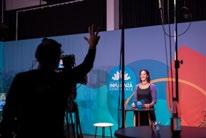

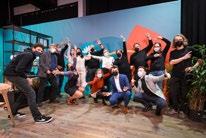


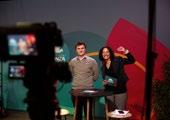
For #ESWI2021 ESWI decided on a fully virtual edition. Virtual attendance went hand-in-hand with the possibility to interact with all participants via the virtual platform. All sessions were streamed and will remain available for all attendees until January 31st 2022.
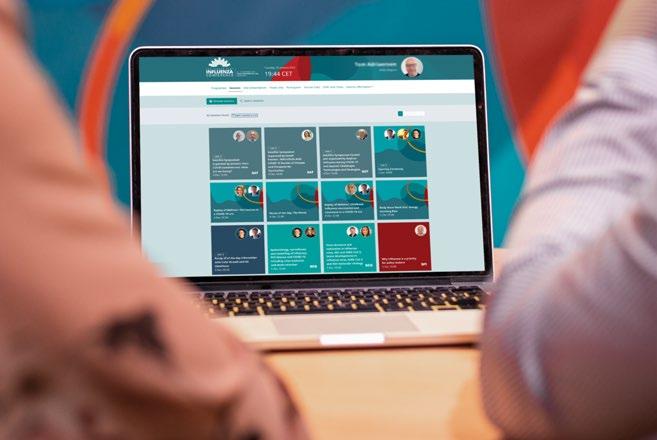
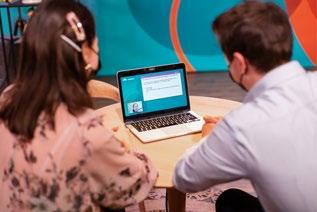
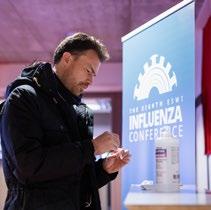

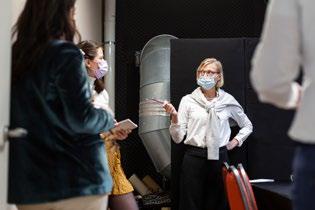
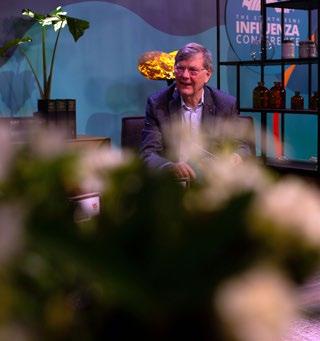
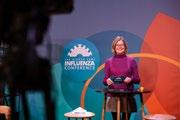
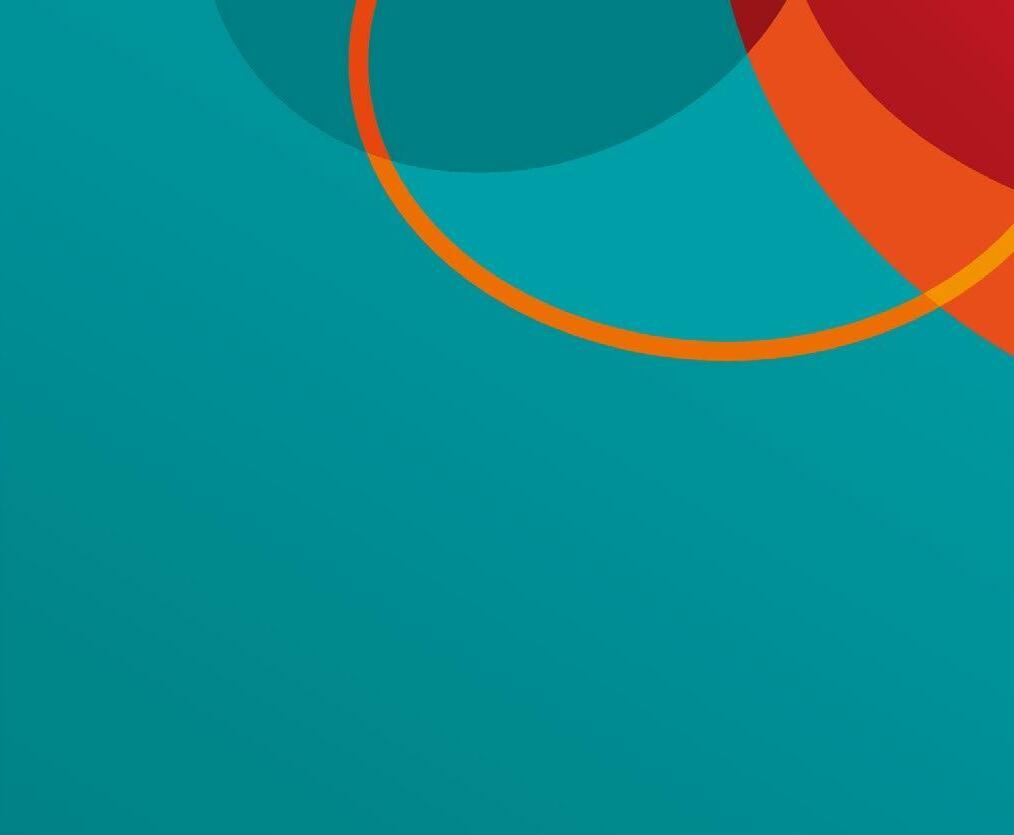

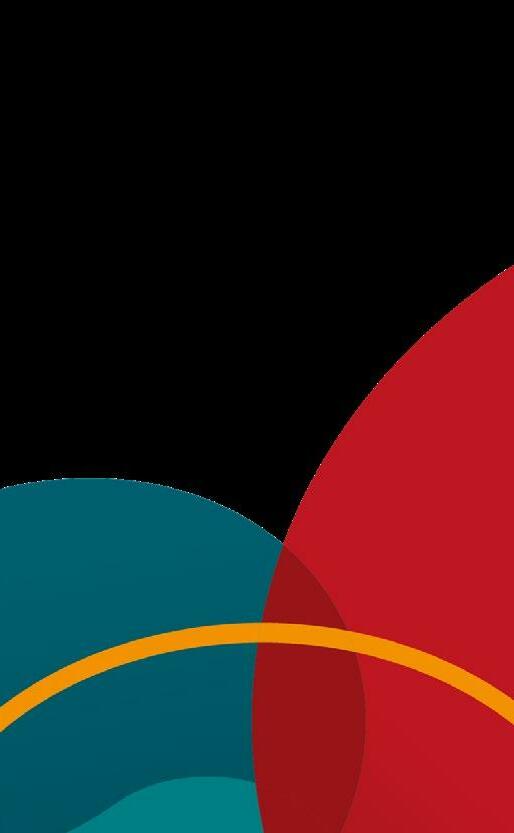
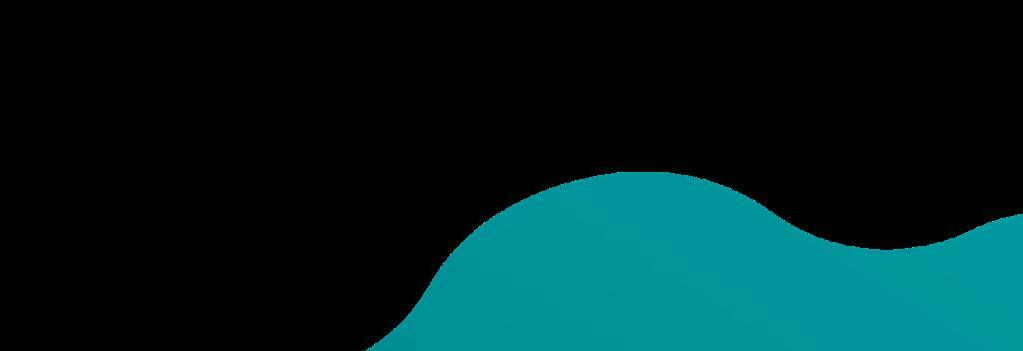
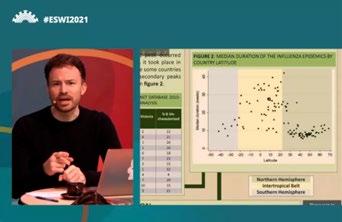

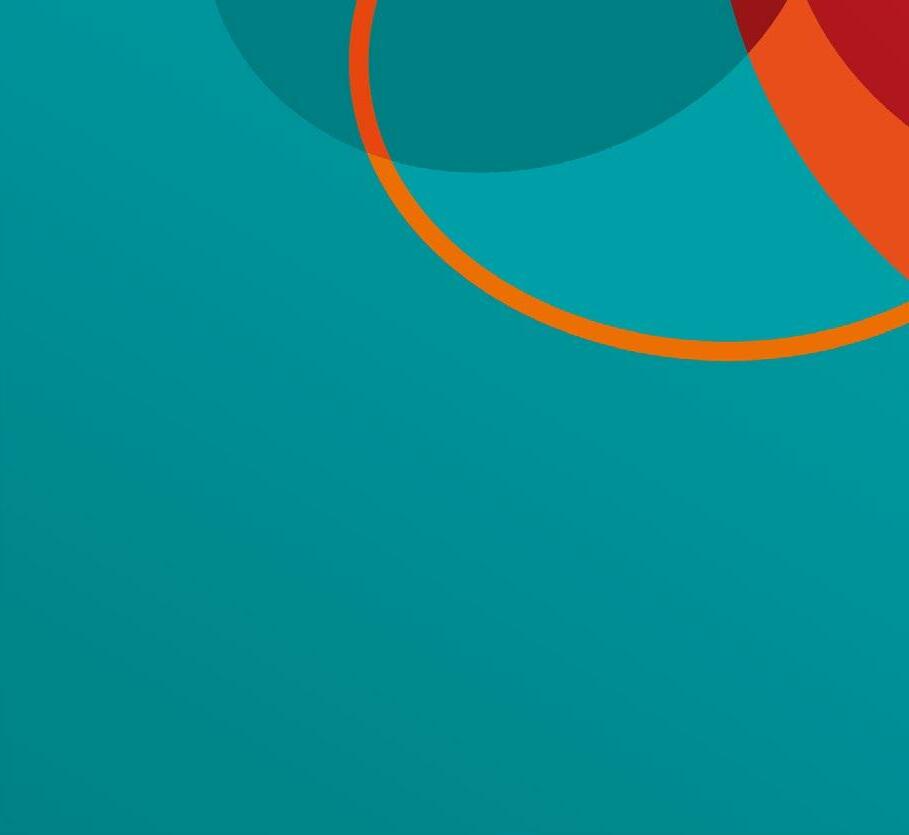
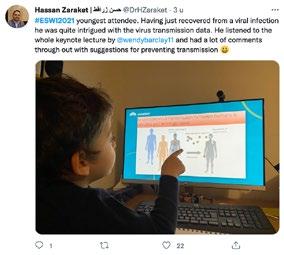
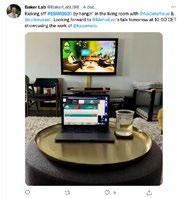
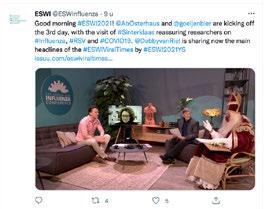
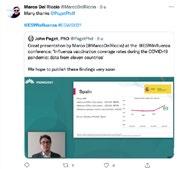
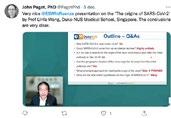

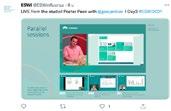
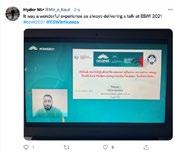
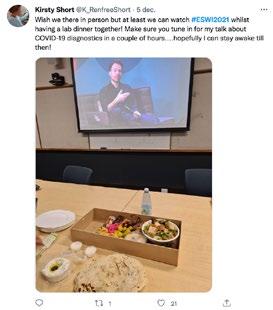


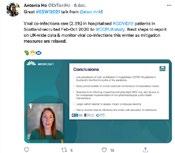



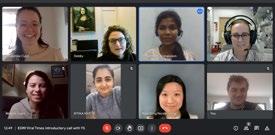
The sixth edition of the Claude Hannoun Prize for Best Body of Work went to Seth Zost, Postdoctoral Fellow, Vanderbilt University Medical Center for his substantial accomplishments to date in the field of understanding influenza virus dynamics.

The second edition of the ESWI Young Scientist Innovative Award, a research grant supported by Seqirus, went to Nicholas Wu, Assistant Professor, University of Illinois at Urbana-Champaign, for his innovative research in vaccine development.

Our laureates gave a keynote lecture during the Young Scientists Plenary session at the 8th ESWI Influenza Conference - #ESWI2021 virtual edition.
Immunodominance and antigenic drift: lessons from influenza and SARS-CoV-2 Seth Zost

Public antibody responses to influenza and SARS-CoV-2 Nicholas Wu
 Seth Zost
Nicholas Wu
Seth Zost
Nicholas Wu
Stimulating the careers of promising researchers being one of ESWI’s objectives, 50 Young Scientists received a grant to attend the #ESWI2021 virtual edition – with the kind support of Seqirus. All co-chairs of the scientific sessions at the 2021 Conference were Young Scientists.


People with diabetes face a higher risk for influenza and its complications and national and international guidelines advise that diabetes patients be annually vaccinated against influenza. The attention for the impact of influenza on diabetes patients, however, is low and so is the vaccine uptake in this group.
In October 2017 leading diabetes organisations and the European Scientific Working Group on Influenza (ESWI) joined forces to forge an active Influenza-Diabetes Community (IDC) to raise awareness of the impact of influenza on people living with diabetes.
The IDC is a unique community that has continued to grow and expand its membership. ESWI serves as its Secretariat and IDC is chaired by ESWI Board Member, Marco Goeijenbier. The IDC has been supported by Sanofi Pasteur since its inception and an outreach towards coalition partners and relevant stakeholders is also part of IDC activities. The IDC is open to new supporters and members that share the IDC vision and mission.
Annual work plans include regular, quarterly meetings with invited guest lectures, overviews of recently published scientific articles and discussions and exchanges among Community members of best practices, campaigns, and webinars.
Optimal care for, and prevention of, respiratory virus infections in people living with diabetes.
To increase awareness within the care community of the burden of influenza, COVID-19 and RSV in people living with diabetes. To ensure access to care, and to ensure the translation of scientific data supporting clinical recommendations for effective protection from infection and disease, including non-pharmaceutical measures, vaccination and anti-viral treatment.

Three quarterly member meetings were held in May, September and December, with one invited guest lecturer per meeting. In May, Dr Kirsty Short, Australian research fellow at the School of Chemistry and Molecular Biosciences at the University of Queensland, presented her research on using glycaemic variability as an early marker. At the September meeting Associate Professor Felix Wensveen, Department for Histology and Embryology University of Rijeka, Faculty of Medicine presented his
research on Type 2 Diabetes and infection and interactions between immune & endocrine systems during viral infection. Our invited speaker at the December meeting was Bram Palache, a Member of the Editorial Board for the #TogetherAgainstFlu campaign. The mission of the campaign has been and continues to be to achieve a long-term mindset change towards the risk-perception of influenza and an increased and sustainable uptake of immunisation rates to take full advantage of its benefits.







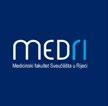


The Influenza Diabetes Community united scientists, healthcare professionals, stakeholders and patients on 16 November to discuss protecting diabetes patients from severe respiratory virus infections. A key take-away was that tailored and targeted messaging is key to communicating the benefit of vaccination for flu and COVID-19. We should be aware of complacency when it comes to seasonal respiratory viral infections. Reaching out to risk group patients to get vaccinated remains a priority.
The event was truly global in outreach, featuring distinguished speakers from Australia, the EU, Turkey, the UK, and the US. Co-chaired by Dr Marco Goeijenbier, Chair of IDC and Dr Konstantinos Makrilakis, Board Member IDF Europe, the webinar was divided into three sessions: best practice examples on prevention; a focus on science; followed by a panel discussion. Prof. Ab Osterhaus, Chair ESWI summed up and concluded the webinar with key messages.
PROGRAMME
14:30 Opening and welcome by chairs
Dr. Marco Goeijenbier
Chair IDC
Dr. Konstantinos Makrilakis
Board Member IDF Europe
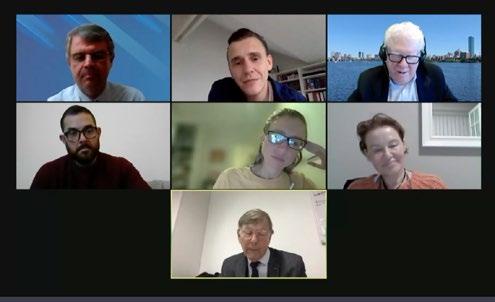
14:40 Best practice examples on prevention

Daniel Howarth
Head of Care, Diabetes UK
Dr. Robert Gabbay, MD



Chief Scientific and Medical Officer, American Diabetes Association
15:00 Science session
Respiratory viral infections and diabetes –what have we learnt from COVID-19?
15:30 Panel Discussion
Q&A with co-chairs, speakers and Ms Sebnem Guneyman
15:55 Closing remarks and take home message
Dr. Kirsty Short School of Chemistry and Molecular Biosciences, University of Queensland

Ms Sebnem Guneyman

Diabetes Advocate, living with T1D
Prof. Ab Osterhaus

Chair ESWI
you can review the webinar via www.idcwebinar.org
,
The Respiratory Virus Summit, entitled Pandemic Preparedness: Where Science and Policy Meet, will take place in Brussels on Tuesday 21 June 2022. Themes of the Summit include early warning systems, diagnostic platforms, pathogen discovery, mathematical models, clinical trial platforms, non-pharmaceutical intervention and treatment strategies, pharmaceutical intervention strategies, education, communication, and global cooperation.
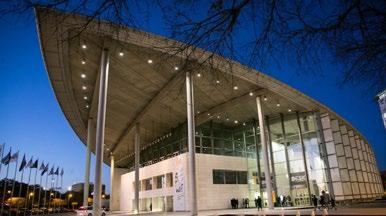


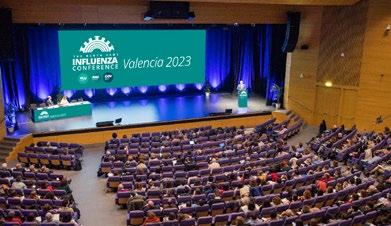
ESWI continues to create, collect and disseminate relevant scientific content about influenza, RSV disease and COVID-19 with three important objectives

■ to reinforce ESWI’s presence and increase awareness
■ to increase interaction with target audiences
■ to promote ESWI events and other relevant events
Visitors of the www.eswi.org website can browse through our videos on various influenza topics in ESWI TV, get the information they need from our influenza knowledge center, stay informed about ESWI’s biennial influenza conferences, its symposia and roundtables, and the yearly Influenza Summits.
ESWI is committed to ensure that the content is up to date to maintain relevance.
The ESWI portal website also hosts the Influenza Diabetes Community webpages, a dedicated influenza/diabetes section that serves as a virtual reference center on diabetes and influenza.


ESWI manages and constantly updates a database of some 17.000 influenza stakeholders worldwide. ESWI is ready to use this platform in any influenzarelated educational project, as it is a highly flexible tool to reach the global flu field in just a few clicks. Another tool in ESWI’s web-based communication strategy is its monthly newsletter. The ESWI newsletter FLUZINE offers a selection of influenzarelated articles collected from a range of media sources. Fluzine is hence a costeffective way to enhance ESWI’s visibility in the influenza community.
In 2021 a brand new newsletter was created for ESWI members. With this newsletter we keep members informed about what’s going on in-house, news from our members and stakeholders, as well as EU news, engagement opportunities and events.

ESWI thanks the entire community of members, coalition partners and sponsors for the great collaboration in 2021. 2022 is set to be another interesting, busy and fruitful year. To realise our goals and meet our ambitious objectives, ESWI will continue to rely on our partners. Our joint forces are the strength of ESWI, allowing the organisation to play a unique role in the field of influenza and respiratory virus infections.
If you have any questions about the European Scientific Working group on Influenza, please contact info@eswi.org


